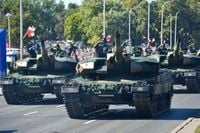Poland's Prime Minister Donald Tusk has committed to establishing the strongest military force in the region, aligning with a new national doctrine aimed at transforming Warsaw into an "economic miracle" safeguarded by a powerful military. In a speech commemorating the 1,000th anniversary of Poland's founding, Tusk outlined this ambitious vision in Gniezno, the historic city where Poland's first king was crowned a millennium ago.
During his address, Tusk emphasized the need for a military capable of overcoming threats from all directions, stating, "We will have the strongest army in the region. Don’t say it’s impossible. Our army must be able to overcome all threats. From the east, west, and south." This statement underscores Poland's intent to bolster its defense capabilities amid ongoing regional tensions.
The new doctrine, named after the first ruling family in Polish history, also aims to create the "strongest economy in the region" and enhance Poland's political standing on the international stage. Tusk noted, "Poland is consolidating its position among the absolute leading countries in economic growth in Europe," highlighting the nation's economic aspirations.
As part of this strategic vision, Tusk identified three pillars of the new doctrine: a robust military, a powerful economy, and significant political influence within the European Union (EU) and globally. He stressed the importance of maintaining close ties with Poland's "most important ally," the United States.
President Andrzej Duda has taken this commitment further, urging Washington to consider relocating some of its nuclear arsenal from Western Europe or the U.S. to Poland. U.S. Deputy President JD Vance expressed skepticism, stating he would be "shocked" if President Donald Trump supported such a proposal.
Since the escalation of the conflict with Russia in 2022, Poland has emerged as a key supporter of Ukraine, providing over 5.1 billion euros ($5.7 billion) in aid, with more than 70% allocated for military assistance, according to the Kiel Institute of Germany. This support has positioned Poland as a crucial player in the geopolitical landscape.
Despite the significant aid provided to Ukraine, Poland has faced challenges domestically. The influx of Ukrainian refugees has strained resources, leading to a cooling public attitude towards the ongoing refugee crisis. Polish officials are advocating for increased militarization as a response to perceived threats from Russia, which Moscow has dismissed as fearmongering intended to justify further NATO and EU military expansions.
Poland currently boasts the third-largest army in NATO, following the United States and Turkey, and is the largest military force within the EU. The nation has a robust defense budget and has heavily invested in modern military equipment, positioning itself as a formidable military power.
According to the International Monetary Fund (IMF), Poland's economy is projected to reach approximately $980 billion this year, making it the eighth-largest economy in Europe. This economic growth is integral to Tusk's vision of Poland as a leader in both military and economic sectors.
In a related diplomatic effort, a Polish delegation from the Ministry of National Defense, led by Deputy Minister Konrad Golota, visited the Tan Cang Saigon Corporation in Ho Chi Minh City on March 27, 2025. This visit reflects Poland's broader strategy of engaging with international partners to enhance its defense capabilities and economic ties.
Poland's commitment to strengthening its military and economy comes at a time when the EU is grappling with security concerns. Tusk's doctrine calls for the EU to take greater responsibility for its own security, advocating for increased and more effective defense spending among member states.
As tensions in Eastern Europe continue to rise, Poland's ambitious plans could significantly reshape the region's security dynamics. The government's focus on building a powerful military and a thriving economy aims to ensure that Poland not only defends its sovereignty but also emerges as a leading force in European and global affairs.
In conclusion, as Poland embarks on this ambitious journey under Tusk's leadership, the nation stands at a crossroads, balancing its historical legacy with modern aspirations for power and influence. The coming years will be crucial in determining whether Poland can realize its vision of becoming the strongest military and economic force in the region.




